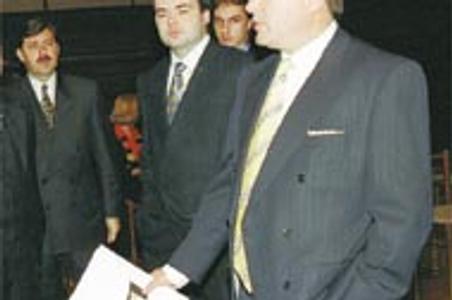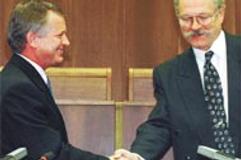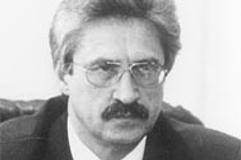Archive of articles - November 1998, page 5
If you desire to read an old article, use the search bar or select the publication date.
VSŽ defaults on $35 mil. loan
Steelmaker VSŽ Holding, the largest Slovak company and once the nation's mightiest industrial force, failed to repay a $35 million syndicated loan on November 9. Although the company said it was continuing to negotiate with its creditors, the de facto default was the most tangible sign to date of the company's financial distress.With VSŽ in deep trouble, the Slovak government suggested a November 10 meeting with company management to discuss solutions, including possible state guarantees for company debts. The stakes were enormous, for if VSŽ went bankrupt, Slovakia would face a social explosion as another 25,000 workers joined the country's long unemployment lists.
Guard changed at FNM
In yet another sweeping dismissal of civil servants installed by the previous government, the newly formed Slovak parliament replaced all top officials of the National Property Fund (FNM) privatisation agency on November 6. A new FNM presidium took over the function of the previous executive committee, and immediately declared its intention to review dubious sales of state property during the reign of former Premier Vladimír Mečiar."It is our political duty to re-assess privatization decisions under the former FNM management," said Vladimír Drozda, state secretary at the Ministry of Privatization. "We will be held accountable for our deeds by the people who supported us in the elections and who wanted the [privatization] mechanisms to change."
STV director recalled
One of the new coalition's primary pre-election objectives was secured on November 11 when parliament voted to recall Igor Kubiš from his post as director of the state-run STV station. Kubiš, said the government, was responsible for having turned the public media channel into a propaganda tool of the government of former Premier Vladimír Mečiar."This is the first step towards turning the ideological centre [of Mečiar's HZDS party] into a public institution," said Ján Budaj, vice chairman of the parliamentary Committee for Culture and Media.In order to have Kubiš dismissed, the government first had to change the STV Law, shortening the terms of the members of STV Council, who alone are allowed to suggest replacing the STV Director.
Coalition sends right signals to market
The stock market fell by 5.0% during the past two weeks as positive developments on the political scene did not translate into a change in investor sentiment. The lack of a domestic investor base means that any recovery of the market is dependent on an inflow of foreign funds. However, investors are currently looking for sound macroeconomic figures and Slovakia has little too offer on this front. Furthermore, negative corporate earnings growth expected for 1998 and next year, together with the unlikelihood of interest rate relief, do not provide fundamental support for higher equity prices.
Jarovnice's Romanies still recovering from floods
Three months ago, flood waters in eastern Slovakia took the lives of 48 people, mostly Romanies living in a ramshackle settlement in the village of Jarovnice. Today, the displaced families are still trying to recover a semblance of normal life and ensure that they at least have a roof over their heads as winter approaches.In their efforts, the Romany villagers are being aided by Jarovnice village, as well as by many Slovak corporations, NGO's and the Ministry of Construction. But as temporary shelters are erected on the sites of former Romany shacks, Slovak bureaucracy and Romany culture are finding themselves increasingly out of step.Maria Richmanová of the Prešov region's Department of Social Affairs said that the state had ordained that in each temporary one-room cottage, or 'unimobunka' erected, only four people are allowed to live, "so we have had a problem deciding what to do with families with more than four members."
New government bungles parliamentary protocol
For four hours on November 3, the Slovak parliament was deadlocked by the refusal of opposition party deputies to declare themselves present for voting. The situation was an embarrassment for the country's new governing parties, who in their second day in parliament had omitted to ensure that enough of their own deputies would be qualified to take part in house debates.Slovakia's house of Parliament has 150 seats, and at least 76 deputies must declare themselves present for parliamentary sessions to commence. But on November 3, the government was hoping to swear in replacements for those 21 deputies who had taken government posts and thus given up their parliamentary seats.
Parliament adopts revised municipal election law
A revised municipal election law amendment was adopted by the newly formed Slovak parliament on November 4. The elections, originally planned for November 13-14, have now been postponed until December 18-19.An accompanying constitutional amendment to prolong the term in office of incumbent local officials until the new election date was also approved in abbreviated legislative proceedings.The municipal elections had to be postponed after a Constitutional Court verdict of October 15, according to which the latest law draft, muscled through the parliament by the cabinet of former Premier Vladimír Mečiar in July, contained six unconstitutional provisions, including a measure to split deputies along ethnic lines.
NBS promises to aid bank sector recovery
The National Bank of Slovakia (NBS) is ready immediately to offer 7.6 billion Sk ($211 million) for the recovery of the banking sector. However, the central bank must wait for the new Slovak government to take the necessary legislative steps, NBS vice governor Jozef Mudrík said in an interview with the domestic SITA news agency on November 4.In accordance with the law, the central bank has created provisions for credits extended by the troubled IRB (Investment and Development Bank) and Konsolidačná banka (Consolidation Bank - KBB), stated Mudrík. He said that the central bank was ready to provide these sources as soon as this year. Nevertheless, it required a change in legislation, because the law stipulated the use of reserves and provisions for purposes other than those for which the NBS would like to use them in this case.
New secret service director promises clean hands
General Vladimír Mitro, the Slovak Intelligence Service's (SIS) new director, gave a rare interview to the daily newspaper Sme on November 3, the same day he was appointed to the job. Mitro promised journalist Peter Tóth that investigating crimes in which the SIS was suspected of involvement would be his greatest priority. The SIS is suspected of involvement in the 1995 kidnapping of the son of the former Slovak President, Michal Kováč, among other offences.
Foreign Minister Eduard Kukan: Slovak foreign policy targets Brussels
Eduard Kukan, Slovakia's new Foreign Minister, was born in 1939 in Trnoverc nad Váhom, a small village in western Slovakia. He studied foreign policy at the Institute of International Relations in Moscow, and then later received a PhD in law at Charles University in Prague.Kukan is a career diplomat, who has served at missions in Zambia, the US and Ethiopia. He was also the Ambassador of the former Czechoslovakia, and later of Slovakia, to the UN in New York. He served as Foreign Minister in the 1994 Moravčík government. He speaks fluent English, Russian, Czech and Swahili, and is married with two children.
Health Care Minister Tibor Šagát
Tibor Šagát, 56, was born in Čierny Balog, a small village in central Slovakia. He studied pediatrics at the Faculty of Medicine at Charles University in Prague. He worked as a medical doctor at several hospitals around Slovakia, and was the head of the Juvenile Clinic in Bratislava. In the 1994 Moravčík government, Šagát served as the Minister of Health Care, and from 1994 to 1998 he was a parliamentary deputy for the Democratic Union, later part of the SDK. He is married with two children.Given the current crisis in Slovakia's health care sector, Šagát has many hard choices ahead of him as Minister. The Slovak Spectator caught up with him in Parliament, and asked him how he planned to solve the sector's most pressing financial and structural problems.
Rhone Poulenc buys out Chemlon Humenné
Rhone Poulenc Slovakia Holding announced on November 3 that it had obtained a 43% stake in Chemlon Humenne, formerly held by the state-owned Chemes Humenne. Rhone Poulenc had previously owned 57% of Chemlon. Michal Halko, Chemlon vice-president, said that Rhone Poulenc had obtained the shares via a tender for their purchase announced by the state privatisation agency, the National Property Fund (FNM) in August.The company plans to invest some 500 million Sk ($14 million) in Chemlon in the near future. The investment projects embrace modernization of fibers for tires and new production units for the production of fibers for airbags.
Foreign debt service to hit $50 mil. in 1998
The total volume of the foreign debt service of Slovakia ensuing from the official debt of the Slovak government and the National Bank of Slovakia (NBS) is $468 million in 1998, the daily news agency SITA reported. Of this sum, Slovakia has to repay approximately $50 million in principal and interest by the end of the year. In all probability, these payments will be covered from the official reserves of the state."I don't think it would be a problem to pay the $50 million by the end of the year, " said Ján Toth, an analyst with Tatra Banka. "It's too small amount, concerning foreign currency reserves, which represent about $3 billion."However, Toth said that a larger problem existed in the impossibility of increasing state reserves. "The reserves cover less than is considered to be a safe level," he said, adding that if something happened and the NBS had to support the Slovak crown, "they could do only verbally rather than practically."
New mobile network tender cancelled by ministry
A walk down the streets of most Slovak cities gives a clear indication that the mobile phone market is a healthy and thriving business. Nowadays, seemingly everyone, from company executives to secondary school students, can be seen toting and talking on their portable telephones.This is great news for EuroTel and Globtel, the two companies that currently constitute the entire mobile phone market in Slovakia and which obtained licenses to operate on the Globale Service Mobile (GSM) 900 frequency in January, 1997. Over half a million Slovaks today own mobile phones, over eight percent of the country's total population.
Around Slovakia
Two try to bank fake bucksPolice find illegal weapons in carCostly and uncertain bed gamesJuvenile delinquents detained
IBM and Compaq cudgel wits to increase sales
Since Compaq's acquisition of Digital in June 1998 (see story, page 1), the Slovak brand name PC market has become a battlefield between two rival IT armies - those of Compaq and IBM.The two competitors are currently suffering from the effects of Slovakia's economic malaise, which has knocked the wind out of brand name personal computer sales and given a market advantage to the far cheaper no-name PC's. IBM and Compaq, as a result, are fighting back by emphasizing the sophisticated services they offer."I have the feeling that PC market in Slovakia is in decline," said Miroslav Majoroš, general director of IBM Slovakia. "To some extent, it may have been caused by elections and the related freeze on investment. Also, the [fact that the Slovak government will be forced to issue a] provisional state budget for next year could influence sales in a negative way."
State share in brewery sold to unknown buyer
Pivovary a sladovne Hurbanovo, a state-owned malt producer which represented the 34% government stake in Zlatý Bažant (Gold Pheasant), Slovakia's largest brewery, was transferred on September 25 to a new firm in the brewing industry, the Hurban trading company.The state privatisation agency, the National Property Fund (FNM), asked the Agriculture Ministry to delete the state-owned share in the Hurbanovo brewery from its register because it had been sold to the Hurban company, the winner of a public tender. The tender had been announced in the Slovak media on August 18, allowing potential buyers six days to apply for purchase.
- Ambulance hit by Russian drone goes on display in centre of Bratislava
- Bratislava’s embassy-backed events you don’t want to miss
- Slovakia mourns Pope Francis, a shepherd of hope and humility Photo
- “Return not,” the ocean cried. But I returned for her
- Slovakia’s public finances remain in deep trouble
- Prices surge in Slovakia as inflation hits 15-month high
- Danish shoemaker to shut Slovak factory, axing 650 jobs in fresh blow to struggling region
- News digest: Finns air unseen video of Fico shooting, PM’s bloody jacket driven away by minister
- Ambulance hit by Russian drone goes on display in centre of Bratislava
- Bratislava’s embassy-backed events you don’t want to miss
- “Return not,” the ocean cried. But I returned for her
- Slovakia mourns Pope Francis, a shepherd of hope and humility Photo
- When to shop over Easter: Opening hours for supermarkets in Slovakia
- Slovakia’s public finances remain in deep trouble
- Slovak Matters: A flirtatious Easter of water and whipping
- The British Film Institute shines a light on Slovak cinema’s boldest chapter Video
- Ambulance hit by Russian drone goes on display in centre of Bratislava
- “Return not,” the ocean cried. But I returned for her
- Bratislava’s embassy-backed events you don’t want to miss
- The British Film Institute shines a light on Slovak cinema’s boldest chapter Video
- 3 free things to do in Bratislava in the next seven days
- Slovakia's latest basketball star is destined for great things in the USA
- When to shop over Easter: Opening hours for supermarkets in Slovakia
- Weekend: What to make of Easter in Slovakia
- “Return not,” the ocean cried. But I returned for her
- Ambulance hit by Russian drone goes on display in centre of Bratislava
- German shoemaker Lowa joins wave of factory closures in Slovakia
- 3 free things to do in Bratislava in the next seven days
- US giant pulls plug on Slovak factory, axing 137 jobs
- When to shop over Easter: Opening hours for supermarkets in Slovakia
- Danish shoemaker to shut Slovak factory, axing 650 jobs in fresh blow to struggling region
- Hundreds of people ousted from Bratislava’s Volkswagen
- Slovakia mourns Pope Francis, a shepherd of hope and humility Photo
- Confetti, chants and history: Hejková’s dream goodbye after nearly 40 years at the top
- Slovakia’s public finances remain in deep trouble
- Ambulance hit by Russian drone goes on display in centre of Bratislava
- Why this gorge deserves a spot on your bucket list Photo
- The British Film Institute shines a light on Slovak cinema’s boldest chapter Video
- Bratislava’s embassy-backed events you don’t want to miss
- Water supply to be cut in parts of Bratislava’s Old Town in late April More articles ›








